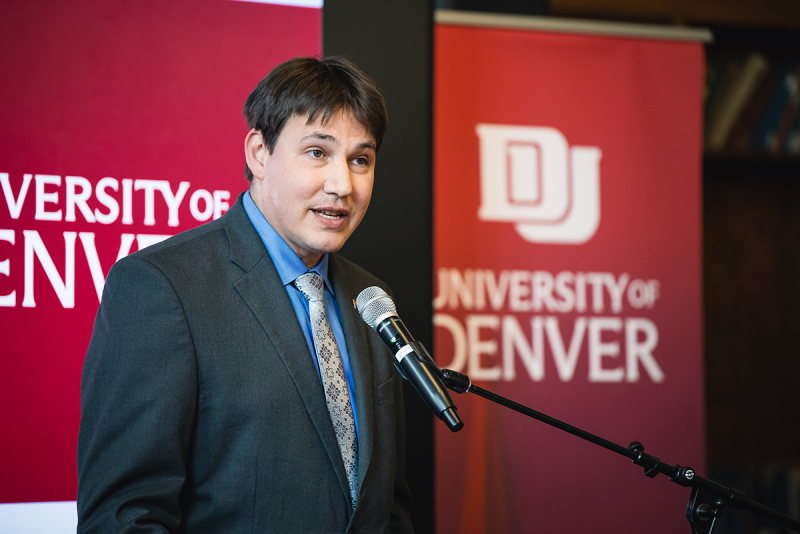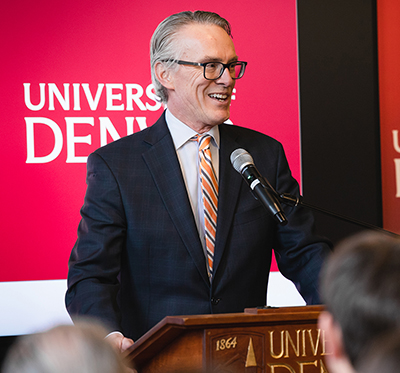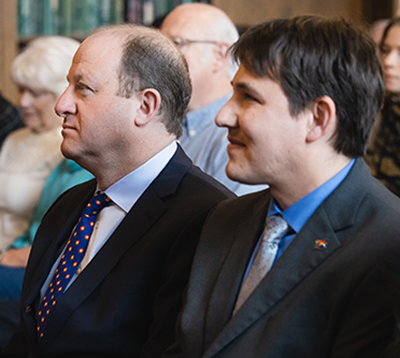Governor Polis and First Gentleman Reis Celebrate Launch of DU Institute for Animal Sentience and Protection

Colorado first gentleman Marlon Reis
As a child, Colorado first gentleman Marlon Reis remembers how he watched the family cat, Callisto, “for hours on end…as she stood with her front paws on our living room windowsill, and gazed out at—what?—something so captivating that it held her in rapt attention as the minutes passed.” He was left to ponder the mystery of what was so interesting to her, but Mr. Reis knows “that animals lead rich and fulfilling lives when—as humans—we allow them to be themselves.” That sentiment encapsulates the primary aims of the University of Denver’s new Institute for Animal Sentience and Protection: to expand the scientific understanding of the cognitive and emotional capabilities of non-human animals, and to advance the protections for them that emerge from that knowledge.
On Tuesday, March 7, both the first gentleman and Governor Jared Polis were among the individuals gathered in the Renaissance Room of DU’s Mary Reed Building to join in launching the new institute and expressing gratitude for Robert Brinkmann, Ph.D., DVM, whose generous pledge of his entire estate will enable its founding. The Institute for Animal Sentience and Protection is a collaborative effort, reflecting the contributions of DU’s Graduate School of Social Work through its existing Institute for Human-Animal Connection, and the Sturm College of Law’s Animal Law Program.
Dean Bruce Smith of the law school opened the event by noting the University of Denver’s unique capacity to host such a program: “a place dedicated to tackling complex interdisciplinary challenges.” As Chancellor Jeremy Haefner described it, “this is an example of the public good in action.” The chancellor projected that the institute “will have long-lasting impact across our state and across our country…I see it changing education and changing research moving forward.”
For Governor Polis, DU’s new institute “is an opportunity for Colorado to be known nationally and internationally for work in this emerging area. ‘Colorado For All’ has been the focus of my administration, and that means our majestic landscapes, our outdoor spaces, our people—it also means our animals.” Both the governor and first gentleman reflected fondly on the hours they spend with "first pup" Gia, the dog who leads them on ever-changing daily adventures and whose “complex emotional life” is clearly expressed through “her opinions about everything.”
In recognizing the scholarship that is already emerging in the realm of animal sentience, both Mr. Reis and Philip Tedeschi, a clinical professor in the Graduate School of Social Work and founder of the Institute for Human-Animal Connection recognized Marc Bekhoff, Ph.D., who was in attendance and who has written extensively on the evolving understanding of researchers in the field. In a recent Daily Camera article, Dr. Bekhoff wrote that this emerging scientific understanding “provides a strong foundation for people who want to use ‘being sentient’ to protect and respect the lives of animals with whom we interact in a wide variety of venues.” One of those people, also present at the event, was Professor Justin Marceau, a legal scholar and director of the Sturm College of Law’s Animal Law Program. The crux of the interdisciplinary collaboration at the heart of the new institute is the intersection of this scientific understanding and the foundations of legal protection for non-human animals.
Although Dr. Brinkmann was unable to attend the event due to weather conditions in his home state of Wyoming, his presence “in spirit” was acknowledged by all. The legacy of his gift is expected to have a transformative impact that will be felt well beyond the walls of DU, and for many years to come. As Mr. Reis concluded, “DU has always been at the forefront of this essential understanding: that as humans, we are very much part of a global ecosystem, and that life takes on meaning not by how we control it, but by how it surprises and delights us in a world of seemingly infinite possibilities.”
The Institute for Animal Sentience and Protection at the University of Denver is set to launch a voyage of exploration into how science and law can interact to better understand and protect our non-human-animal fellow adventurers.




